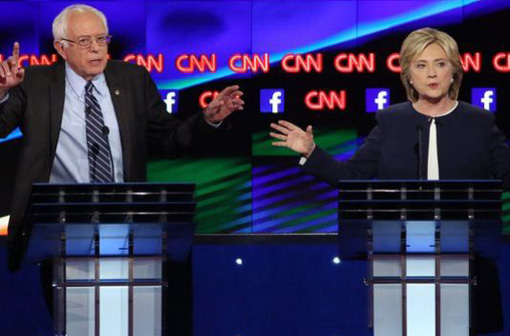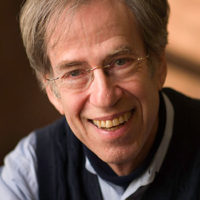
WASHINGTON – As they campaign for support in the Wisconsin primaries to be held Tuesday, April 5, the contrast is stark between the Republican and Democratic candidates.
The Republican candidates for the presidential nomination are all about self-aggrandizement. They’re tearing each other apart like kids in a vicious playground fight. Hitting below the belt is de rigueur.
On the other hand, the Democratic Party candidates are debating who has the best plans for serving the nation.
Bernie Sanders did not gloat or taunt Hillary Clinton when he won the caucuses in Washington State, Alaska and Hawaii by close to four to one. Far from it. In his victory speech, he talked of unity.
“Hillary and I agree,” Sanders said, “that it’s absolutely imperative that no Republican make it to the Oval Office.”
As of now, the CNN poll shows Sanders winning in Wisconsin by four percentage points. However, to gain the 2,383 delegates needed to win the nomination, he will have to win every primary and caucus to be held between now and June by margins of about 60 percent. Furthermore, most super delegates now pledged to Clinton would have to switch to Sanders.
As of now, Clinton has 1,712 delegates. She won 1,243 in primaries and caucuses. The other 469 are super delegates, mostly Democratic Party elected officials who will take part in the decision-making at the Democratic National Convention but who are not bound by votes cast in any primary or caucus.
Sanders has 1008 delegates: 979 he won by votes and 29 are super delegates.
So far, no super delegate has indicated an inclination to switch sides.
Counterpunch online magazine reports that super delegates from 33 states are beholden to Clinton for helping them raise money for their own campaigns for various offices.
Early in the campaign season, Bill and Hillary Clinton turned the Hillary Victory Fund into a money raising operation jointly managed by the Clinton campaign and the Democratic National Committee itself. Donors who reach the legal limit of how much they can contribute to a federal campaign are allowed by law to make additional contributions to the same campaign through entities such as the Hillary Victory Fund.
The Fund has the ability to split proceeds between the Clinton presidential campaign and state Democratic organizations.
For the full Counterpunch article, go here.
Looking to the future
No matter how the Clinton and Sanders campaigns are structured or funded, their main focus is on preventing the right wing from gaining complete hegemony over the American government. They each stressed this in their speeches at the Democratic Party Founders gala in Wisconsin on Saturday.
Furthermore, in an interview on the Young Turks show recently Sanders addressed the question of whether or not the “political revolution” movement he is building will support Hillary Clinton if she gets the nomination.
The Young Turks is the largest online news show in the world, with over 1.5 billion views. Host Cenk Uygur told Sanders, “a lot of the people in the movement have decided that you are their leader.” He asked “If you were to lose, and the Democratic Party comes to you and says take this movement that is full of energy and that is against the establishment, and make sure they vote for [Hillary Clinton] what do you say?”
Sanders answered, “Well … what I say: number one I’m not that big into being a “leader”… I’d much rather prefer to see a lot of leaders and a lot of grassroots activism.
“Number two, what we do is together, as a nation.”
Republican food fight
Meanwhile, in the media, it’s the all-Donald-Trump-show-all-the-time.
For example, it became front page news when Trump made a campaign issue out of how photographs of his wife compare to pictures of Ted Cruz’s wife.
What’s more, name calling is swiftly covered: Cruz calls Trump “Duckin’ Donald; Trump calls Cruz “Lyin’Ted.”
Trump is correct about Cruz, but he can’t keep his own lies straight. In the course of a few days, he said diametrically opposite things about his campaign manager attacking a reporter. (The reporter, by the way, was from the far right Breitbart News network. Their doctored video tapes helped destroy ACORN and led many elected officials to falsely believe that Shirley Sherrod, a very progressive Agricultural Department official, was anti-white.)
And, of course, Trump lied about seeing “thousands of thousands” of people celebrating the 9/11 attack.
But Trump’s words really do not matter to his campaign or to his supporters. Encouraged by the media, Trump is not running as a candidate with ideas for America. He is running as a personality.
Unfortunately this masks the fact that when Trump does articulate positions, they are – with a few bizarre exceptions – the exact same positions held by Cruz and John Kasich.
All three are pushing tax plans that would enrich the already rich. All three advocate entirely deregulating business, and all three are pledged to “end Obama Care,” “rip up” the Iran anti-nuclear development deal, kill off unions, and abolish the EPA, IRS and Department of Education.
Good news/bad news
The good news: the latest CNN poll shows that in a general election, Sanders would beat Trump by 19 percentage points, Cruz by 13 points and Kasich by two points. Clinton would beat Trump by 10 percentage points. However, she would tie with Cruz and lose to Kasich. (Of course poll numbers change rapidly.)
The bad news: in an attempt to keep themselves in power and their policies in place, right wing lawmakers have passed state laws making it more difficult for working people, minorities and the poor to vote. For example, in both the Arizona and North Carolina primaries many potential voters were turned away.
However, across the nation there is a growing mass movement to support new federal laws that would outlaw voter suppression.
Photo: While GOP candidates engage in a smear fest the Democratic candidates, Bernie Sanders and Hillary Clinton, are debating the issues. | AP

MOST POPULAR TODAY


Zionist organizations leading campaign to stop ceasefire resolutions in D.C. area

High Court essentially bans demonstrations, freedom of assembly in Deep South

Communist Karol Cariola elected president of Chile’s legislature

Afghanistan’s socialist years: The promising future killed off by U.S. imperialism






Comments